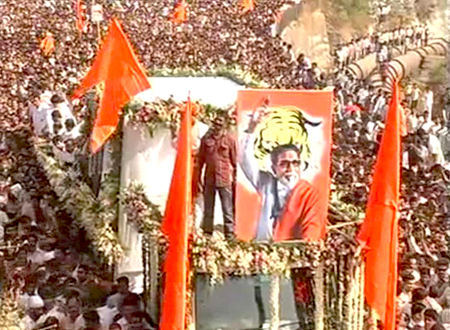
Mumbai, November 18: The final journey of Shiv Sena patriarch Bal Thackeray began with his body being taken out for funeral procession from his residence in suburban Bandra on Sunday morning amid presence of thousands of grief-stricken Shiv Sainiks, who have come from across Maharashtra.
People were also seen showering flowers on their beloved leader, who breathed his last on Saturday, after battling prolonged illness.
Thackeray, who was critically ill since last Wednesday, was declared dead last afternoon by Dr Jaleel Parkar who was treating him. The Sena chief had been suffering from respiratory problems and pancreatic disease.
According to doctors, Thackeray passed away at 3.33 p.m. due to cardiac arrest.
Thackeray’s cortège will first go to Sena Bhavan, the party headquarters in Dadar, and the body would later be kept at Shivaji Park for people to pay their last respects.
People thronged the roadsides, flyovers, skywalks and balconies of their buildings to catch a glimpse of the Sena patriarch and pay homage to him.
In view of the legions of crowds pouring in to pay their last respects to Balasaheb, it is estimated that the funeral procession would take more than two hours to reach the Sena Bhavan (party headquarters) at Dadar.
Lakhs of Shiv Sainiks are walking along with the funeral procession, shouting slogans in memory of the Shiv Sena chief.
Scores of Shiv Sainiks arrived in the city from different parts of the State, largely from neighbouring Thane, Raigad, Pune, Aurangabad and Konkan region, which are the bastions of the saffron party, founded on June 19, 1966.
Lakhs of people were waiting since early morning to pay last respects to the leader, some even standing on the street poles.
Shiv Sainiks have also formed a human chain to enable the procession pass smoothly.
According to reports, hordes of people are arriving in the metropolis to attend the cremation of the Sena chief, to be held in the evening at 6 p.m. at the Shivaji Park, for which the Sena has taken special permission.
Thackeray addressed his first speech at the Shivaji Park ground and used to address the annual Dussehra rally there.
The body will be kept at Shiv Sena Bhavan for sometime to allow the party office-bearers to pay their last respects.
Extensive security arrangements have been put in place in the State, particularly in Mumbai, with over 20,000 police personnel deployed in the metropolis to keep a tight vigil.
Security has been beefed up at Matoshree and Shivaji Park with vehicular traffic prohibited in and around the area.
Meanwhile, a bandh-like situation prevailed in many parts of the city, Navi Mumbai and Thane in the wake of Balasaheb’s death.
“The State government has already announced that Thackeray will be accorded a State funeral,” State Protocol Minister Suresh Shetty said.
The bereaved Thackeray family is accompanied by several Sena leaders including Manohar Joshi, Diwakar Raote, party spokesperson Sanjay Raut, Neelam Gorhe, Vinayak Raut, Anil Desai, Subhash Desai, senior BJP Gopinath Munde, among others.





Comments
Add new comment